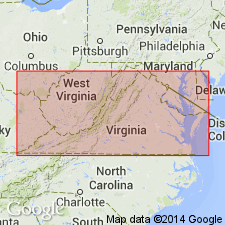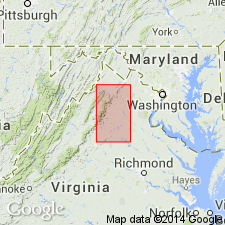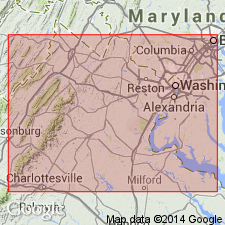
- Usage in publication:
-
- Battle Mountain Complex
- Modifications:
-
- First used
- Dominant lithology:
-
- Granite
- Syenite
- AAPG geologic province:
-
- Piedmont-Blue Ridge province
Summary:
Tollo and Arav (in press) propose that Robertson River Formation of Allen (1963) be revised to Robertson River Igneous Suite to emphasize the lithologic diversity that characterizes this belt. Rocks range in composition from alkali syenite to alkali feldspar granite to granite. This suite is the largest group of intrusives within the Blue Ridge province of VA. Extends from near Upperville, 70 mi southwest to northern suburbs of Charlottesville. Includes at least nine mappable lithologic units, among them, the Battle Mountain Complex, which underlies the area between Little Battle and Battle Mountains. Unit was introduced as Battle Mountain felsite by Wallace and Tollo (1986 abstract). Composed of alkali feldspar granites, subvolcanic felsites, and rhyolite. Intrudes the Laurel Mills Granite.
Source: GNU records (USGS DDS-6; Reston GNULEX).

- Usage in publication:
-
- Battle Mountain Alkali Feldspar Granite*
- Modifications:
-
- Principal reference
- Dominant lithology:
-
- Granite
- AAPG geologic province:
-
- Piedmont-Blue Ridge province
Summary:
Recent detailed mapping and petrologic analysis indicate rocks previously assigned to Robertson River Formation include a series of granitoids, syenitoids, and felsites emplaced sequentially during 30 m.y. episode of magmatism. Collectively, the rocks form a dike-like mass of intrusions extending nearly 100 km from vicinity of Charlottesville, VA, to north-northwest of Ashby Gap, VA. Therefore, name is revised to Robertson River Igneous Suite. At least 8 units of the suite are distinguishable by mineral composition, texture, bulk chemical composition, and U-Pb-determined isotopic age, and can be mapped at 1:24,000 scale. Battle Mountain Alkali Feldspar Granite is named for Battle Mountain. Type locality is roadcut near south end of Battle Mountain on north side of VA Hwy 729, located 0.55 km (0.35 mi) east of intersection with VA Hwy 618, Massies Corner 7.5-min quad, northern VA. Consists of a composite of alkali feldspar granite and felsite. Alkali feldspar granite is more abundant and is typically cut by numerous felsite dikes that cannot be distinguished a 1:24,000 map scale (Hawkins, 1991). Granite is typically blue-gray, medium-grained, and aegerine-bearing, whereas felsite (lithologic term used herein for fine-grained, light-colored igneous rocks not demonstrably volcanic origin) is typically blue-gray, aphanitic to sparsely porphyritic, contains aegerine, and is also weakly flow banded (Hawkins, 1991). Weakly flow-banded felsite is in contact with medium-grained alkali feldspar granite at type locality. Battle Mountain rocks are in fault contact with Middle Proterozoic basement gneiss along eastern border of Robertson River outcrop belt. Dikes of Battle Mountain (felsite) cut Laurel Mills Granite and Amissville Alkali Feldspar Granite (both new) in vicinity of Battle Mountain. Age is Late Proterozoic. Report includes geologic map.
Source: GNU records (USGS DDS-6; Reston GNULEX).

- Usage in publication:
-
- Battle Mountain Alkali Feldspar Granite*
- Modifications:
-
- Geochronologic dating
- AAPG geologic province:
-
- Piedmont-Blue Ridge province
Summary:
U-Pb zircon age for the granite component of the Battle Mountain Alkali Feldspar Granite is 705+/-2 Ma. U-Pb zircon age for the felsite component of the Battle Mountain is about 702 Ma.
Source: GNU records (USGS DDS-6; Reston GNULEX).
For more information, please contact Nancy Stamm, Geologic Names Committee Secretary.
Asterisk (*) indicates published by U.S. Geological Survey authors.
"No current usage" (†) implies that a name has been abandoned or has fallen into disuse. Former usage and, if known, replacement name given in parentheses ( ).
Slash (/) indicates name conflicts with nomenclatural guidelines (CSN, 1933; ACSN, 1961, 1970; NACSN, 1983, 2005, 2021). May be explained within brackets ([ ]).

